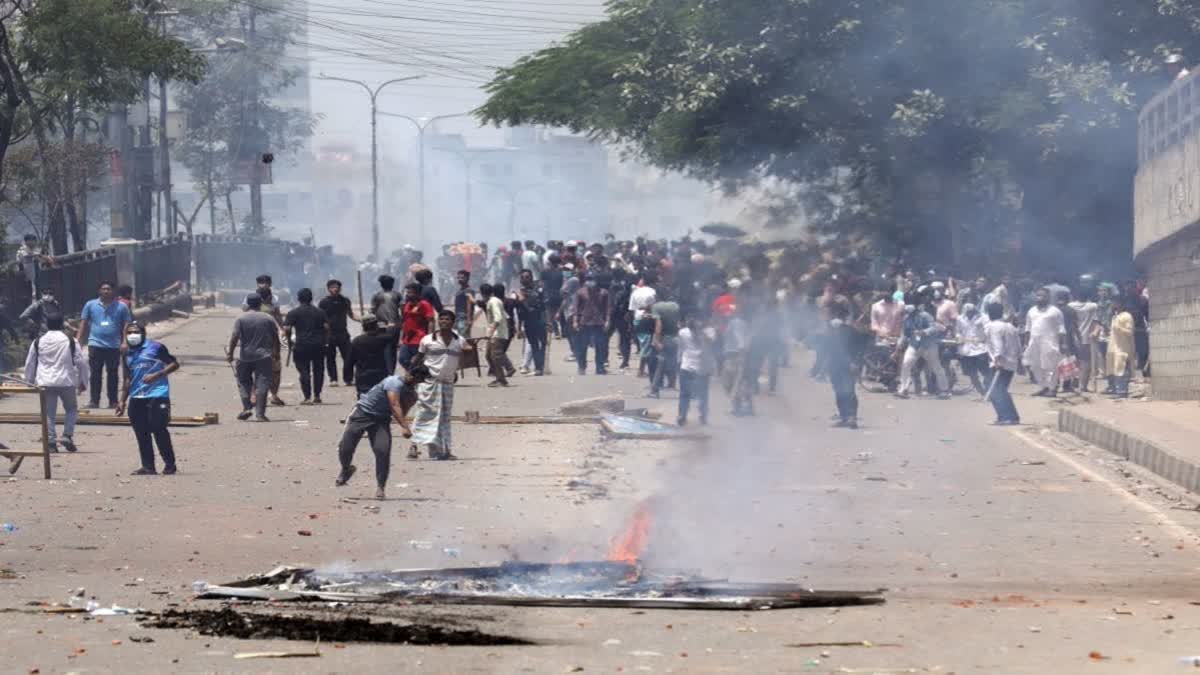New Delhi : Bangladesh is currently on the boil again as anti-government protests have escalated, with demonstrators demanding Prime Minister Sheikh Hasina’s resignation. According to sources, an interim military govt has been established as the situation has gone beyond control. The Bangladesh Premier Sheikh Hasina has reportedly stepped down and left the country. Meanwhile, army chief, Waker-Uz-Zaman, addresses the nation confirming that the Army has taken over Dhaka, urging people to cooperate and refrain from violence.
In response to the situation, G Parthasarathy, a former diplomat and commissioned officer in the Indian Army, acknowledged the challenges in Dhaka and emphasized the significance of India's relationship with Bangladesh due to the shared border, mutual interests in the Bay of Bengal, and implications for the Northeastern states. He emphasized the importance of India's close monitoring of the situation and posed the question of the military's potential involvement. Expressing concern about the current measures taken to control the violence, he also urged for a constructive approach to address the unrest.
When asked about the potential geopolitical implications, especially for India, Parthasarathy recognized Bangladesh's historical societal complexities, emphasizing the need for sustained efforts to maintain stability. He highlighted the possibility of radical groups influencing the political landscape and noted that India needs to be concerned as it might lead to communal problems that might spill over into India.The former ambassador emphasized the need for a constructive, forward-looking approach and expressed hope that the situation would be effectively managed for the benefit of all parties involved.
Bangladesh has been witnessing massive protests and violence that began last month after student groups demanded scrapping of a controversial quota system in government jobs. That escalated into a campaign to seek the ouster of Hasina, who won a fourth straight term in January in an election boycotted by the opposition. At least 91 people were killed and hundreds injured on Sunday in a wave of violence across the country of 170 million people as police fired tear gas and rubber bullets to disperse tens of thousands of protesters.
Meanwhile, given the ongoing developments, India has updated its advisory on Sunday, 4th August for its nationals in Bangladesh. The advisory said, "Given ongoing developments, Indian nationals are strongly advised against travelling to Bangladesh till further notice. All Indian nationals presently in Bangladesh are advised to exercise extreme caution, restrict their movements and remain in contact with the High Commission of India in Dhaka through their emergency phone numbers:+8801958383679 +8801958383680 +8801937400591". Over 8000 Indian students have left Bangladesh since the outbreak of violence in the last few weeks.
Prime Minister Hasina has served as the Prime Minister of Bangladesh consecutively since January 2009. She is the world's longest-serving Muslim woman leader whose tenure has finally come to an end.
India-Bangladesh ties
India and Bangladesh share a multifaceted and dynamic relationship rooted in historical, cultural, and geographical ties. India played a crucial role in Bangladesh's War of Independence in 1971, providing military support that helped Bangladesh gain independence from Pakistan.
Economic Cooperation. India is one of Bangladesh's largest trading partners. Bilateral trade has grown significantly, with both countries benefiting from tariff concessions and duty-free access under various agreements.
Indian companies have invested in various sectors in Bangladesh, including telecommunications, energy, and manufacturing. Several initiatives have been taken to enhance connectivity, such as the development of road, rail, and waterway links. The Maitree Express (train) and bus services between the two countries are notable examples.
India supplies electricity to Bangladesh, and there are joint ventures in power generation. Both countries collaborate closely on security issues, including counter-terrorism and tackling insurgent activities along the border. While there have been border disputes, significant progress has been made in recent years to resolve these issues through agreements like the Land Boundary Agreement (2015).
Bangladesh and India share a 4,096-kilometre-long (2,545 mi) international border, the fifth-longest land border in the world, including 262 km (163 mi) in Assam, 856 km (532 mi) in Tripura, 318 km (198 mi) in Mizoram, 443 km (275 mi) in Meghalaya, and 2,217 km (1,378 mi) in West Bengal.
Read More



